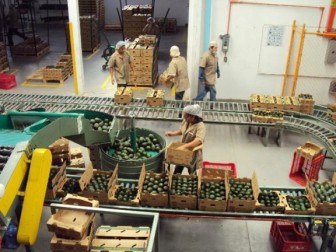Guyana is one of several Caribbean food exporters that will benefit from a 500 pounds Special Assistance Programme available through the Caribbean Export Development Agency (CEDA) under the European Union’s 10th Regional Private Sector Development Programme to help companies prepare for new, more demanding food safety requirements which exporters to the United States will be required to satisfy under the US Food Safety Modernization Act (FMSA) scheduled to come into force in January next year.
The programme which has already been implemented in Jamaica since October covers a wide range of national consultations, advocacy and sensitization initiatives and is the first segment of a wider project which will seeks to address the needs of exporters throughout the region in enhancing quality and standards to meet the export markets of both the US and the region’s other key trading partners including Canada and the European Union.

Under the programme companies in the Caribbean will also be able to access up to five thousand pounds to meet costs associated with undertaking needs assessments and conducting diagnostic procedures which will enable them to better qualify themselves to meet North American and European export regulations. The facility also allows qualified firms seeking access beyond what is available under the Special Assistance Programme4 to access a further thirty thousand pounds under a Direct Assistance Grant Scheme.
CEDA Senior Adviser, Market Intelligence, David Gomez says that the facility that is being made available to business entities across CARIFORUM countries and the Dominican Republic and is intended to complement other initiatives being undertaken at the national and regional levels to prepare food exporters in the region for the introduction of the FSMA. Gomez says that initially, the facility will be rolled out in Jamaica where diagnostics will be provided for “between twenty and thirty companies” after which it will become available to the rest of the region.
US Deputy Commissioner for Foods, Food and Drug Administration said last month that the new legislation seeks to respond to the need for food safety systems based on the food industry’s primary responsibility to prevent food safety problems, the need for risk-based, prevention-oriented standards and stronger accountability for meeting those standards and the need for a global approach to food safety.
The new legislation empowers the US Food and Drug Administration to embargo ‘suspect’ food, that is, food for which there is proof that it has been produced under unsafe and insanitary conditions. Such conditions might include incorrect pasteurization or canning, unsafe storage, and a lack of health-related testing even though such foods may not at the time have specific contamination. Other rules contained in the legislation include a condition that the importer inform the US FDA if another country has refused entry of the same product on the grounds that it might be unsafe.
Countries in the region including Guyana are likely to face costly operational and logistical compliance challenges and financial support apart, the CEDA initiative seeks to provide technical support for efforts to upgrade standards.
When Stabroek Business spoke with Head of the local Food and Drug Administration a few weeks ago she underscored the importance of local companies exporting food to the United States putting their houses in order pointing out at the same time that the development was likely to prove a finaicial challenge for smaller business houses whicxh might have to pool their resources in order to meet the health and safety standaqrds required under the new US legislation.
The targeting of Jamaica as the first country in the region to benefit from the CEDA Facility is linked to the fact that that the new US legislation will reportesly impact directly on close to 50 per cent of that country’s food exports though some Jamaican business officials say that there are positives to be derived from the implementation of the new compliance system which they say will enhance competitiveness and market access globally.
The new legislation coincides with initiatives being taken in Guyana, principally through the Guyana Manufacturers and Services Association (GMSA) and the New Guyana Marketing Corporation to promote the export marketing of locally produced goods particularly in the agro-processing sector.
Established in 1996 by an inter-governmental agreement as the trade promotion agency for member states of CARIFORUM, CEDA)is charged with increasing the competitiveness of Caribbean countries by providing quality trade and investment development and promotion services through effective programme execution and strategic partnerships.




